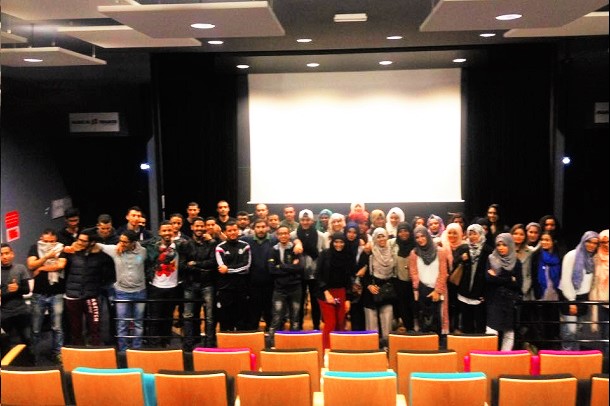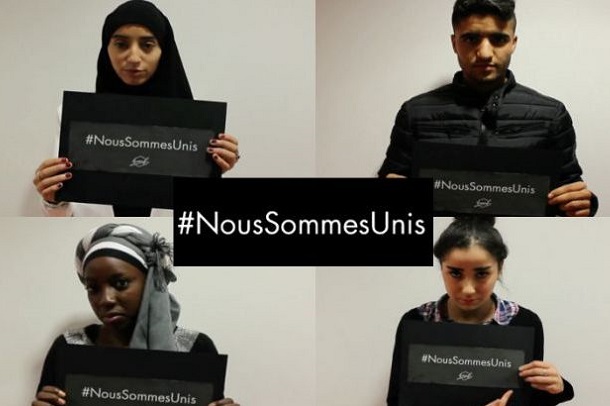Disclaimer: The EMF is an a-political organization. The views shared by Mr. Essid are personal and do not necessarily reflect the official position of the association.
Let’s start by talking about you. What is your name, where were you born, where did you grow up?
Edem Essid: My name is Edem Essid, I was born in la Seyne sur Mer, 15 miunutes away from Toulon in the Var region, on the 16th of July 1990. I am doing a master in history at the university in Aix-en-Provence, my specialization is archive and library studies.
How did you come across the association? Why did you take part in it?
The first time I heard about the EMF (association Etudiants Musulmans de France or French Muslim Student association) was during an event that happens every year in Marseille called the Annual Meeting of the Muslim Students of the South. I was introduced to the new Toulon section by a friend from my family´s village back in Tunisia who was already involved. I was interested in the organization´s effort to improve the image of Muslim Students in society and I decided to become more and more involved in the projects.
And now you are the president of the marseille section, right?
Yes, exactly.
What are the goals of the association?
The EMF has two main sections: the first one entails its mission to help Muslim students across the country and the second one is about demystifying the negative clichés about Muslim people in society and particularly in universities.
We support students in three different ways: With our social assistance, we help foreign students to get settled in France, for instance finding them an accommodation or offering food packages to those with financial problems. Then we also organize many cultural events such as conferences, debates in cafés and expositions. Finally we are active in student unions, we want to be recognized by the universities´ administration councils and to represent the students´ interests. This aspect is not yet quite developed in Marseille but we are working towards this goal.
How important is religion for you?
I was born and educated in this religion but not an expert, so I do not have the knowledge to really talk about it. Also, in the EMF we don´t preach any beliefs since there are many different interpretations of Islam. Personally, religion has a big influence on my life, but contrary to what many people think, the fact that you are born a Muslim doesn´t mean that you have to focus only on religion. Even learning about secular sciences like math, history or medicine is a way to worship God in our religion, so being Muslim doesn´t prevent me from being open to the world.
What was your experience growing up in France? Do you think there are differences between the French society and the Muslim community?
I grew up as a normal French citizen so I have never experienced the clichés attributed to Muslim people in the media and in politics. There are certain economic factors that influence a part of the Muslim population, especially first-generation migrants because they came here with nothing, and many end up repeating the social habits of their parents. However, an increasingly important and significant part of the community is highly educated and contributes actively to the development of society.
My grandmother arrived in the 60s and my mother was born in the 70s, she did not have much of an education. Today my sister, my brother and I are all university students, so it took almost 50 years to build this future of educational possibilities. It is the same for the social mobility of other second or third generation immigrants.
Let’s move on to what happened in Paris. Many people were shocked to see that most of the terrorist grew up in Europe and to observe how a part of the Muslin community is experiencing a phenomenom of radicalization. What factors contribute to it?
In my opinion it is mostly ignorance. ISIS exploits marginalized people because they generally have less access to education. The Paris attackers did not grow up in misery but they lived at the margins of society; they did not educate themselves about the religious texts and the opinions of scholars, they were brainwashed by people promising them paradise.
The problem is the consequences of these actions: we must not stigmatize the entire Muslim community because some have committed crimes in the name of our God. The media seems to be evolving their position on the Muslim community; they published the reaction video produced by the Toulouse section of the EMF and they let us take part in the conversation on the radio, on television panels etc. They are finally recognizing that marginalizing the perspectives of the people in the Muslim community is not the way to fight against religious extremism. On the contrary giving them a voice will help them spread their message of unity with the French people and fight against stereotypes.
What is the role of the EMF in the fight against radicalization?
We are students, we have a central role in the fight against ignorance, so we want to spread knowledge through our cultural and communication activities to fight misconceptions about Islam, like for example with the Toulouse video. When I say misconceptions I also mean the beliefs of those who have extreme interpretation of the Muslim faith.
So tomorrow (Sunday, November 22) you are going to organize a debate. Tell me more about it.
Yes, exactly, we are going to hold a debate in Marseille with the title: “Muslim Students Confronted with Obscurantism: Analysis and What´s at Stake ”. Of course it is open for everybody, not only Muslim students, it is just that we feel like we have the personal responsibility to have a conversation that differs from the message of the Paris terrorists. First off, we are going to analyze the social and political context to understand how we got to this point. Then, we are going to highlight our responsibilities and what we can do to avoid similar events in the future. Lastly, we are going to talk about the consequences the attacks could entail, specifically about the Islamophobic acts that still happen even if the mindset and the media coverage have largely shifted.
This allows us to acknowledge what is happening in the French society and not to be passive, to get people involved and transform them into active actors who can start intelligent conversations about current events. There are many people who are not necessarily very interested in politics and who do not fully understand what happened, so we want to get them involved and to push back against some of the narratives portrayed by the media. I think it would be a missed chance to stay passive in the wake of these events.
Ok so fiinal questions: What are the next projects of the organization, how do you see it develop in the next years?
The Marseille section is still small, we have been around for about five or six years, so we have to strengthen the organization and our communication power. Then, the program changes every year, in 2015 we have mostly been active in the social and cultural areas but we could tackle the student unions aspect in the future.
Is there a project that is near and dear to your heart?
My favorite project is currently being developed, we are going to have a conference and then an exposition at the university in Marseille about Muslim scholars and their scientific knowledge. It is a collaboration with the EMF sections in Grenoble, Toulouse and Lyon. It will help us show a different side of Islam rooted in its intellectual cultural tradition and ultimately to fight against Islamophobia. People will see that there is more to Islam than just the religious texts, that Islam is about all sorts of sciences, both secular and spiritual.


